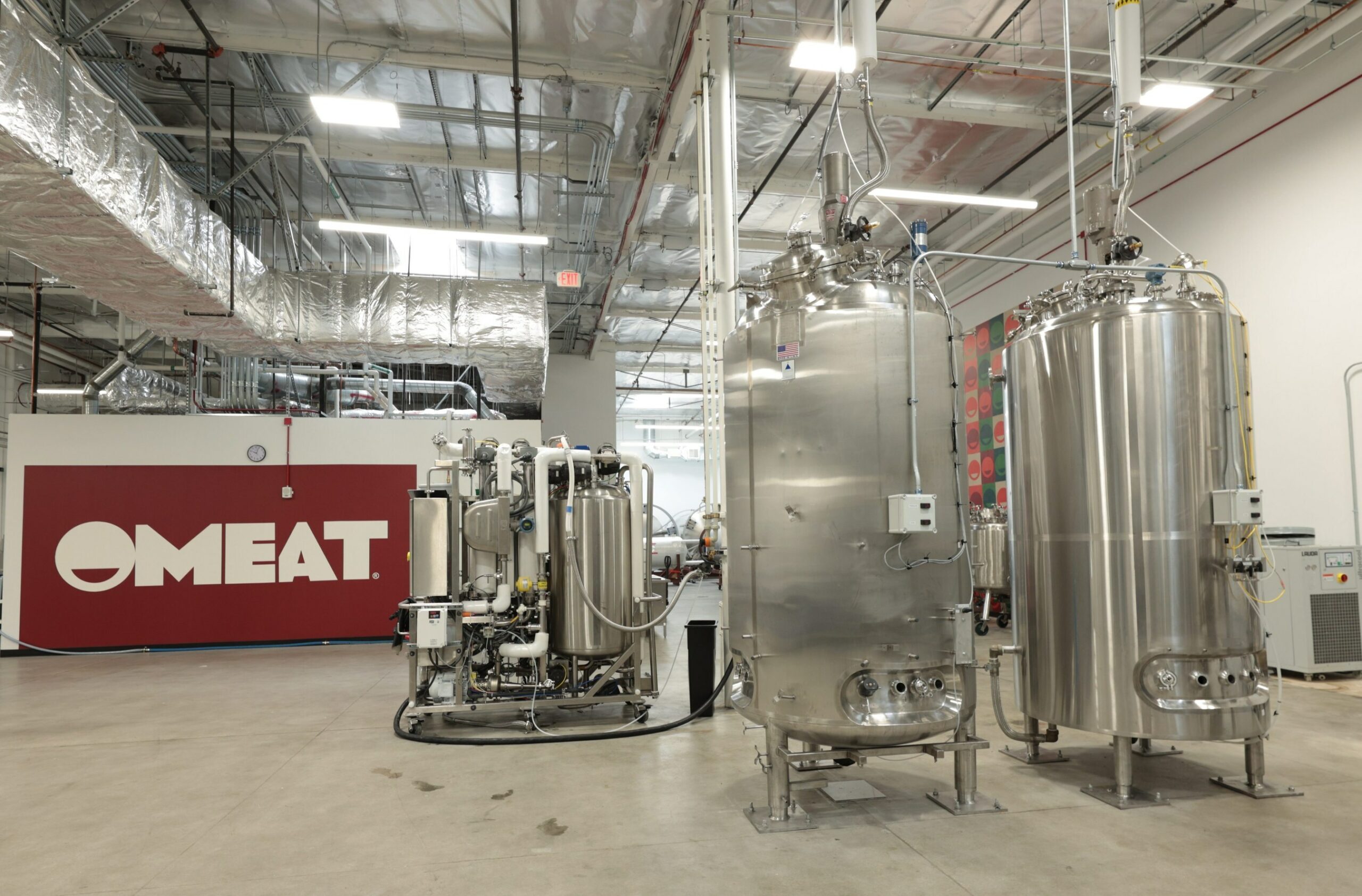Internal Rifts and Layoffs Headline Tough Year for Omeat – But Cultivated Meat Startup Will Soon Close New Funding Round
6 Mins Read
Los Angeles startup Omeat has seen its employee count shrink by about 80%, with a change in leadership brought on by what insiders describe as a hostile work culture, according to AgFunderNews.
It was in June last year that Omeat emerged with a serum-free cell culture media solution for cultivated meat production, but a lot has happened since then, with founder Ali Khademhosseini stepping down from his role of CEO, a majority of its workforce being let go, and a raft of challenges leaving the business reeling.
A former staffer told AgFunderNews that the Los Angeles-based startup now has a skeleton staff of about 10 people – mostly the core science team – which is down from a peak of nearly 50. Khademhosseini, meanwhile, was replaced by CTO Jim Miller in November, following multiple complaints by employees accusing him of creating a toxic working culture.
Omeat was founded in 2021 but came out of stealth last year, unveiling an alternative to fetal bovine serum (FBS) created using regenerative plasma drawn humanely from cows that graze freely on its carbon-negative farm. Collected weekly, the process to extract the plasma is similar to human plasma donation – unlike blood, plasma regenerates quickly, so the cows don’t feel depleted.
But while the company has said that Plenty, its cell culture media supplement, is affordable and scalable, its former employees say that it has had trouble expanding its production process – which eventually led to Khademhosseini launching a tirade that resulted in his removal as CEO.
Scaling the scalability challenge

Scalability is one of cultivated meat’s major bottlenecks, alongside cost. But while Omeat has obtained 2,000-litre and 10,000-litre bioreactors for its new pilot plant in Thousand Oaks California, it’s still in the process of validating its production process at a 200-litre scale, according to an ex-employee. So far, very few cultivated meat companies have successfully validated their bioreactor technology at a scale of or over 200 litres – these include Good Meat, Upside Foods and Vow, all of which have been cleared to sell cultivated meat in Singapore and/or the US.
“At the 200-litre scale, we successfully held media with some cells in there without contamination, but we usually ended up with [fewer] cells than we put in to begin with,” one former employee said.
Another explained that the company had proven “some cell growth” on a 20-litre scale, but it rarely ran the 200-litre bioreactor, noting that it usually failed due to contamination. “They just never had a properly defined process. We also had challenges with cleaning the bioreactors, and when we got the [larger] bioreactors from India, we had to assemble them ourselves, and some stuff was missing; they weren’t great.”
A fellow ex-staffer said these new bioreactors are just sitting there. “Omeat’s ultimate sin was spending all that money transitioning into the pilot plant before we were doing everything properly at lab scale. There was this pressure to scale, scale, scale when we were not ready,” they said. “Omeat isn’t ready to scale. The science isn’t quite ready, and it has effectively gone back into R&D mode, which makes sense.”
A toxic work culture and change in leadership

It was around October that things began to heat up, with Omeat preparing to open its pilot plant but Khademhosseini still feeling progress was slow. He articulated that in a verbal attack on a business trip, which was filmed by employees.
“You guys have demonstrated nothing but incompetence,” he was reported as saying. “Do you want me to be saying: ‘Oh great job for failing for two years?'” The startup’s founder labelled assembled employees as “idiots”, saying he was “sick and tired of all you guys”.
“He just started unloading, he had a complete meltdown,” said one witness. Another added: “He would belittle the team and the PhD scientists. He put them under so much pressure that they would just tell him what he wanted to hear.”
Omeat claims a third-party investigation into the matter found no evidence of wrongdoing or unlawful conduct, but in November, Miller had taken the mantle of CEO. This was followed by layoff rounds earlier this year, with several employees resigning too.
“Ali requested that position shift and it was fully supported by the board. Ali is continuing to work with Omeat as a board member and a scientific advisor,” the company said. On the layoffs, it added: “Omeat had to make a difficult decision to trim the staff because the company believes that it can meet milestones of getting to commercial viability with a smaller staff. This is a testament to how the technology has been validated and is well-defined, and so the company no longer needs such a large R&D team.”
The statement also added that the tech “has been demonstrated at the 200-litre scale”, contrary to the claims of former employees.
“At Omeat, we strive to foster a positive work environment and culture that allows our employees to thrive and focus on the company’s business,” said Miller. “We remain intent on positioning the business to ensure the continued success of Omeat and our mission, including by continuing to secure new sources of funding.”
Omeat to announce new funding soon

Khademhosseini explained the company had taken steps to control costs and extend its runway, revealing that it was closing in on another round of financing, with a “positive announcement” expected soon. So far, Omeat has raised $40M, including a $36.5M Series A in 2022.
In terms of scalability, he claimed Omeat is executing its scale-up plan and that its core tech “remains sound”, adding that it’s dedicating additional resources to help generate sales of its FBS alternative. “Plenty has shown positive results through extensive independent testing by a number of research institutes. We are in the process of assembling these results and will be sharing the Plenty whitepaper publicly very soon,” he said.
“They are trying to raise money, but a lot of people are not willing to invest in alt-proteins right now,” one former employee said. “The capex required to pull this off at scale is in the hundreds of millions and that kind of money just doesn’t seem like it’s out there right now.” They likened it to a chicken and egg situation: “Generalist VCs aren’t going to be willing to invest until they see traction, and cultivated meat is not going to get traction without a whole bunch of capital.”
The global food tech sector saw VC funding drop by 49% in 2023, while financing for alternative proteins dipped by 44%, from $2.9B in 2022 to $1.6B in 2023. This was dominated by plant-based and fermentation startups, with cultivated meat startups only attracting $226M in capital last year (a far cry from the $922M the sector secured in 2022).
The industry has faced its fair share of challenges. Pioneers like Good Meat and Upside Foods have had to deal with financial and scalability hurdles, and Singapore’s Umami Bioworks and Shiok Meats have merged as a marker of consolidation in the category. Cultivated seafood player Finless Foods, meanwhile, recently initiated an alleged second round of layoffs in less than 12 months. The industry as a whole is facing political attacks and threats of bans – with Italy already passing a bill prohibiting domestic production or sale of cultivated meat.
So it’s not out of the ordinary that Omeat’s large-scale cutbacks will raise some alarm bells. However, there is cause for hope too, with Vow and Israel’s Aleph Farms both receiving regulatory approval this year, and Meatable hosting the EU’s first public tasting for cultivated meat last week. 2023 also saw 10 new cultivated meat facilities open, alongside several other alternative protein sites, a trend that can support an estimated 83 million jobs internationally by 2050.




